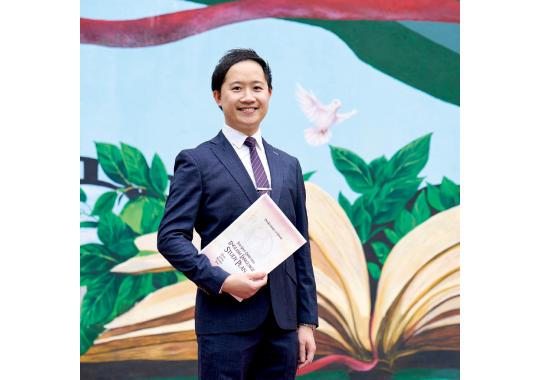學與教資源
Teachers' Information
- Mr LAM Chi-bun
- Ying Wa College
- Teachers presented with the Award for Teaching Excellence of Chief Executive’s Award for Teaching Excellence (2023/2024)
- Subjects Taught: English Lauguage
Teaching Philosophy
In an ever-changing world, I believe that with curiosity and self-learning competence, students will rise to the occasion. I adopt innovative and learner-centred approaches to inspire, motivate and empower students to become active and lifelong learners of English.
Teachers’ Sharing
Cultivating Autonomous Learners: Innovative Strategies for English Language Education
As an English teacher committed to fostering holistic student development, I believe that empowering students to take ownership of their learning is crucial for their success and lifelong growth. This core belief informs and interconnects three principal areas of my teaching practice in English language: developing self-directed learning competence, enriching learning-oriented assessments, and integrating innovative multi-modal methods. These facets are deeply intertwined and collectively enhance the educational experience for my students.
Encouraging Ownership of Learning: The Self-Directed English Language Study Plan
I have consistently observed the importance of self-learning competence among students, especially during the pandemic, where students who actively sought resources and extended their learning beyond the classroom typically demonstrated better performance. This reinforced my desire to develop students’ self-directed learning strategies, so I developed the Self-Directed English Language Study Plan to empower students to manage their learning actively.
My study plan encourages students to set personalised goals using the SMART model, select resources tailored to their needs, and monitor their progress through time-bound targets. This approach not only enhances their ownership of learning but also integrates the application of English in exploring other knowledge areas, which is key to personal development.
Contextualising Learning Outcomes: Learning-Oriented Assessment Enriched with Systemic Functional Linguistics
Building on the foundation of self-directed learning, the next step is to ensure that assessments align with and support this autonomy. In our English Department, we have adopted Learning-Oriented Assessment (LOA) to promote active learning, peer review, and reflection through the three stages: Pre-writing, While-writing, and Post-writing.
To further enhance this approach, I have integrated the Field-Tenor-Mode (FTM) framework into our LOA practices. It is my observation that students often struggle with writing according to given situations due to insufficient real-world exposure to various contexts. Inspired by Systemic Functional Linguistics, the FTM framework helps students analyse texts by considering the context (Field), relationships (Tenor), and communication mode (Mode). This analytical approach improves their ability to write in different contexts and fosters critical thinking and communicative competence.
Leveraging Technology in English Language Education: Innovative Multi-Modal Methods
To fully engage students and make learning dynamic, it is essential to innovate and incorporate multi-modal methods. By leveraging technology, I strive to create interactive and meaningful learning experiences. For example, I have developed Excel games using programming to promote logical thinking and creativity. Additionally, I integrate various digital platforms to facilitate collaborative learning and reflection, ensuring active student participation.
One key feature I have explored in my lessons is the functionality of artificial intelligence (AI) in the English language classroom. This approach not only brings students to the forefront of technology, but also encourages them to critically evaluate AI’s role in language learning as they develop digital and AI literacies.
At the heart of my teaching practice is the belief that by fostering an environment where students are empowered to take charge of their learning, they can grow into proficient English learners and curious explorers of the world.
Sharing of Resources
Teaching Practices
Resources to be shared:
- The Self-Directed English Language Study Plan
- Sample of Learning-oriented Assessment with Field-Tenor-Mode Framework
- Sample Teaching Resource for AI in English Language Education
* 學與教資源只提供英文版



